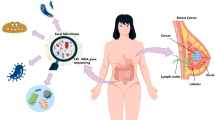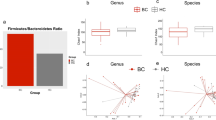Abstract
Breast cancer is one of the most common malignant tumors in women. More than half of breast cancer patients are not menopausal at the time of diagnosis. The occurrence and development of premenopausal breast cancer are affected by many factors. Intestinal flora, especially SCFA-producing bacteria, participates in the development of various tumors, and there is a lack of in-depth research in premenopausal breast cancer patients. We used 16S rRNA gene sequencing, targeted metabolomics, and cell culture methods to analyze the changes in the intestinal flora and metabolites of premenopausal breast cancer patients. In addition, we treated breast cancer cells with significantly altered propionate and butyrate in vitro to examine their effects on cell activity. This study followed STROBE guidelines. We found that compared with healthy premenopausal women, the composition and symbiosis of intestinal flora in patients with premenopausal breast cancer changed significantly. The abundance of short-chain fatty acid (SCFA)–producing bacteria was significantly reduced, and the key SCFA-producing enzymes were also significantly reduced. Pediococcus and Desulfovibrio could distinguish premenopausal breast cancer patients from normal premenopausal women. The related propionate and butyrate had a certain ability to inhibit breast cancer cell viability in vitro. As SCFA-producing bacteria, Pediococcus and Desulfovibrio showed potential reference value for the diagnosis of premenopausal breast cancer. The ability of propionate and butyrate to inhibit breast cancer cell lines in vitro suggests that the relevant SCFA receptor may be a new target for the treatment of premenopausal breast cancer.






Similar content being viewed by others
Data availability
The datasets generated during and/or analyzed during the current study are available from the corresponding author on reasonable request.
References
Fan L, Strasser-Weippl K, Li JJ, St LJ, Finkelstein DM, Yu KD et al (2014) Breast cancer in China. Lancet Oncol 15:e279–e289
Heer E, Harper A, Escandor N, Sung H, McCormack V, Fidler-Benaoudia MM et al (2020) Global burden and trends in premenopausal and postmenopausal breast cancer: a population-based study. Lancet Glob Health 8:e1027–e1037
Al AK, Lophatananon A, Mekli K, Ollier W, Muir KR (2020) Association of nongenetic factors with breast cancer risk in genetically predisposed groups of women in the UK Biobank Cohort. JAMA Netw Open 3:e203760
Goodwin PJ, Segal RJ, Vallis M, Ligibel JA, Pond GR, Robidoux A et al (2020) The LISA randomized trial of a weight loss intervention in postmenopausal breast cancer. NPJ Breast Cancer 6:6
Oluwasanu M, Olopade OI (2020) Global disparities in breast cancer outcomes: new perspectives, widening inequities, unanswered questions. Lancet Glob Health 8:e978–e979
Tercedor J, Munoz F (1989) Leucocyte count in Sweet syndrome associated with malignant hemopathies. Med Clin (Barc) 93:237
Sekirov I, Russell SL, Antunes LC, Finlay BB (2010) Gut microbiota in health and disease. Physiol Rev 90:859–904
Britton GJ, Contijoch EJ, Spindler MP, Aggarwala V, Dogan B, Bongers G et al (2020) Defined microbiota transplant restores Th17/RORgammat(+) regulatory T cell balance in mice colonized with inflammatory bowel disease microbiotas. Proc Natl Acad Sci U S A 201922189
Hu S, Liu L, Chang EB, Wang JY, Raufman JP (2015) Butyrate inhibits pro-proliferative miR-92a by diminishing c-Myc-induced miR-17-92a cluster transcription in human colon cancer cells. Mol Cancer 14:180
Bridgeman SC, Northrop W, Melton PE, Ellison GC, Newsholme P, Mamotte C et al (2020) Butyrate, generated by gut microbiota, and its therapeutic role in metabolic syndrome. Pharmacol Res 105174
Xie QS, Zhang JX, Liu M, Liu PH, Wang ZJ, Zhu L et al (2020) Short-chain fatty acids exert opposite effects on the expression and function of p-glycoprotein and breast cancer resistance protein in rat intestine. Acta Pharmacol Sin
Chen J, Zhao KN, Vitetta L (2019) Effects of intestinal microbial(-)elaborated butyrate on oncogenic signaling pathways. Nutrients 11(5):1026
Arpaia N, Campbell C, Fan X, Dikiy S, van der Veeken J, DeRoos P et al (2013) Metabolites produced by commensal bacteria promote peripheral regulatory T-cell generation. Nature 504:451–455
Clemente JC, Ursell LK, Parfrey LW, Knight R (2012) The impact of the gut microbiota on human health: an integrative view. Cell 148:1258–1270
Rooks MG, Garrett WS (2016) Gut microbiota, metabolites and host immunity. Nat Rev Immunol 16:341–352
Zhu J, Liao M, Yao Z, Liang W, Li Q, Liu J et al (2018) Breast cancer in postmenopausal women is associated with an altered gut metagenome. Microbiome 6:136
Su J, Li D, Chen Q, Li M, Su L, Luo T et al (2018) Anti-breast cancer enhancement of a polysaccharide from spore of ganoderma lucidum with paclitaxel: suppression on tumor metabolism with gut microbiota reshaping. Front Microbiol 9:3099
Song H, Wang W, Shen B, Jia H, Hou Z, Chen P et al (2018) Pretreatment with probiotic Bifico ameliorates colitis-associated cancer in mice: transcriptome and gut flora profiling. Cancer Sci 109:666–677
Fu BC, Hullar M, Randolph TW, Franke AA, Monroe KR, Cheng I et al (2020) Associations of plasma trimethylamine N-oxide, choline, carnitine, and betaine with inflammatory and cardiometabolic risk biomarkers and the fecal microbiome in the Multiethnic Cohort Adiposity Phenotype Study. Am J Clin Nutr
Shukla R, Goyal A (2013) Novel dextran from Pediococcus pentosaceus CRAG3 isolated from fermented cucumber with anti-cancer properties. Int J Biol Macromol 2:352–357
An BC, Ryu Y, Yoon YS, Choi O, Park HJ, Kim TY et al (2019) Colorectal cancer therapy using a Pediococcus pentosaceus SL4 drug delivery system secreting lactic acid bacteria-derived protein p8. Mol Cell 42:755–762
Zhang W, Luo J, Dong X, Zhao S, Hao Y, Peng C et al (2019) Salivary microbial dysbiosis is associated with systemic inflammatory markers and predicted oral metabolites in non-small cell lung cancer patients. J Cancer 10:1651–1662
Zorron CTPL, Yamamoto K, Honda T, Nakamura M, Yamamura T, Hattori S et al (2020) Microbiota profile is different for early and invasive colorectal cancer and is consistent throughout the colon. J Gastroenterol Hepatol 35:433–437
Ge X, Pan J, Liu Y, Wang H, Zhou W, Wang X (2018) Intestinal crosstalk between microbiota and serotonin and its impact on gut motility. Curr Pharm Biotechnol 19:190–195
Canfora EE, Jocken JW, Blaak EE (2015) Short-chain fatty acids in control of body weight and insulin sensitivity. Nat Rev Endocrinol 11:577–591
Wu W-K, Chen C-C, Liu P-Y, Panyod S, Liao B-Y, Chen P-C et al (2019) Identification of TMAO-producer phenotype and host-diet-gut dysbiosis by carnitine challenge test in human and germ-free mice. Gut 68:1439–1449
Wang Z, Klipfell E, Bennett BJ, Koeth R, Levison BS, Dugar B et al (2011) Gut flora metabolism of phosphatidylcholine promotes cardiovascular disease. Nature 472:57–63
Chittim CL, Del Campo AM, Balskus EP (2019) Gut bacterial phospholipase Ds support disease-associated metabolism by generating choline. Nat Microbiol 4:155–163
Sivaprakasam S, Prasad PD, Singh N (2016) Benefits of short-chain fatty acids and their receptors in inflammation and carcinogenesis. Pharmacol Ther 164:144–151
Zhang Z, Cao H, Song N, Zhang L, Cao Y, Tai J (2020) Long-term hexavalent chromium exposure facilitates colorectal cancer in mice associated with changes in gut microbiota composition. Food Chem Toxicol 138:111237
Lambo-Fodje AM, Oste R (2006) Nyman ME. Short-chain fatty acid formation in the hindgut of rats fed native and fermented oat fibre concentrates. Br J Nutr 96:47–55
Anand S, Kaur H, Mande SS (2016) Comparative in silico analysis of butyrate production pathways in gut commensals and pathogens. Front Microbiol 7:1945
Gill RK, Dudeja PK (2011) A novel facet to consider for the effects of butyrate on its target cells. Focus on "The short-chain fatty acid butyrate is a substrate of breast cancer resistance protein". Am J Phys Cell Phys 301:C977–C979
Goncalves P, Gregorio I, Martel F (2011) The short-chain fatty acid butyrate is a substrate of breast cancer resistance protein. Am J Phys Cell Phys 301:C984–C994
Thirunavukkarasan M, Wang C, Rao A, Hind T, Teo YR, Siddiquee AA et al (2017) Short-chain fatty acid receptors inhibit invasive phenotypes in breast cancer cells. PLoS One 12:e186334
Kim CH, Park J, Kim M (2014) Gut microbiota-derived short-chain fatty acids, T cells, and inflammation. Immune Netw 14:277
Hegyi J, Schwartz RA, Hegyi V (2004) Pellagra: dermatitis, dementia, and diarrhea. Int J Dermatol 43:1–5
Bolognini D, Tobin AB, Milligan G, Moss CE (2016) The pharmacology and function of receptors for short-chain fatty acids. Mol Pharmacol 89:388–398
Offermanns S, Schwaninger M (2015) Nutritional or pharmacological activation of HCA(2) ameliorates neuroinflammation. Trends Mol Med 21:245–255
Field N, Cohen T, Struelens MJ, Palm D, Cookson B, Glynn JR et al (2014) Strengthening the Reporting of Molecular Epidemiology for Infectious Diseases (STROME-ID): an extension of the STROBE statement. Lancet Infect Dis 14:341–352
Yeh CC, Tseng CN, Yang JI, Huang HW, Fang Y, Tang JY et al (2012) Antiproliferation and induction of apoptosis in Ca9-22 oral cancer cells by ethanolic extract of Gracilaria tenuistipitata. Molecules 17:10916–10927
Funding
This work was supported by the Anhui University Natural Science research project (KJ2019A0427), Young Research Fund of Wannan Medical College (WK2019F42), and Applied Medical Research Project of Hefei Municipal Health Commission (HWK2016ZC007).
Author information
Authors and Affiliations
Contributions
Junfei Gu and Shiwu Yin conceived and designed the research. Chuan He provided clinical samples, drafted the manuscript, and interpreted the data. Yue Liu analyzed the data. Shandong Ye provided clinical samples and clinical consultation. All authors contributed to the writing of the manuscript and approved the final version.
Corresponding authors
Ethics declarations
Conflict of interest
The authors declare that they have no conflict of interest.
Ethical approval
All procedures performed in studies involving human participants were in accordance with the ethical standards of the institutional and/or national research committee and with the 1964 Helsinki declaration and its later amendments or comparable ethical standards.
Informed consent
Informed consent was obtained from all individual participants included in the research.
Additional information
Publisher’s note
Springer Nature remains neutral with regard to jurisdictional claims in published maps and institutional affiliations.
Rights and permissions
About this article
Cite this article
He, C., Liu, Y., Ye, S. et al. Changes of intestinal microflora of breast cancer in premenopausal women. Eur J Clin Microbiol Infect Dis 40, 503–513 (2021). https://doi.org/10.1007/s10096-020-04036-x
Received:
Accepted:
Published:
Issue Date:
DOI: https://doi.org/10.1007/s10096-020-04036-x




